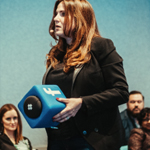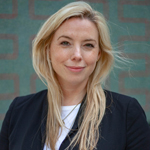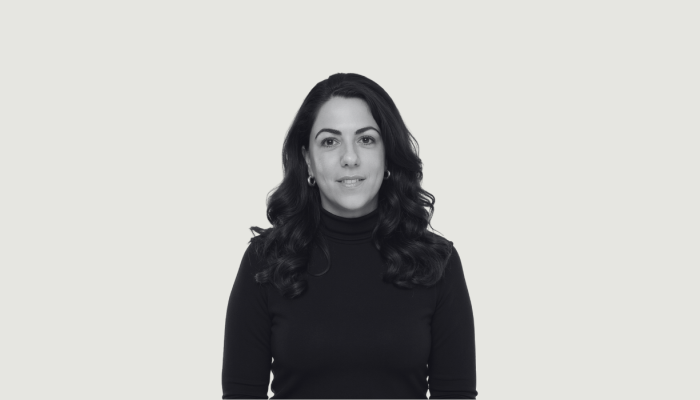As part of a series of articles for International Women's Day we reached out to senior women in the industry to ask them this question:
We’re now three years on from the start of #metoo; what positive changes (and possible backlash to those changes) have you seen in the industry and what more would you like to see change this year?
Elle McCarthy
 Senior Director, Head of Brand Transformation at Electronic Arts
Senior Director, Head of Brand Transformation at Electronic Arts
If you had caught me yesterday, or any day over the last two years, I would have answered this question with less hope. I would have said, that I would like to not see a major awards body in my industry ask someone who allegedly used company funds to pay for prostitution to talk on a panel. I would like to not see a strong female leader invite a man who allegedly exhibited systematic predatory behavior towards many women to secretly help out on a pitch. And I would like to not see another industry body surprise a group of young people with a ‘guest speaker’ who also allegedly harassed many women… I could go on. But today my cheeks are wet from ugly crying on this plane after a shaky Wifi connection pinged a long awaited sentence into my inbox: Mr. Weinstein is guilty of criminal sexual act in the first degree and rape in the third degree. A sentence about a perpetrator without the word “alleged” in it. I’d like more of those please.
Don’t get me wrong, I will shout from the rooftops that most men are good people. And I value my male colleagues and friends as much as I value my female ones. But the mirror of assuming positive intent from men, is assuming truthfulness from women. This movement is not coming for all men, it’s coming for the minority of men who are abusers. And it’s widening the definition of abuse to include things that women have been forced to tolerate for too long. Usually, when closing, I’d write to businesses about what they can do to better support women. But today, I simply don’t trust that businesses will do enough. So it’s with sadness that I give this advice directly to women:
- Don’t confide in HR - they are incentivized to protect the business not you
- Engage with a lawyer and if you can’t afford to, then see if you can get support from the Times Up Legal defense fund
- Talk about what happened to you as little as possible but try to find others who have had the same experiences and show up as a team.
- Reach out to those of us who are vocal in this space. We will reply, meet up with you, buy you a wine or two or five. And we will help even if just with moral support.
- Do not give up.
Justice can happen. It must happen. It will happen. Let’s see more of it in 2020.
Ine Lubbers
 European Marketing Director Vegetables at Nomad Foods
European Marketing Director Vegetables at Nomad Foods
Besides the tangible, necessary legal actions which were taken as a result of #metoo, I would personally say that the intangible impact is even bigger. People around the world have learned how widespread sexual harassment, assault, and other misconduct really are. As more and more survivors spoke out, they learned they were not alone, which I can only imagine is a tremendous good. And although the movement initiated with sexual misconduct, it provokes a wider discussion about power and valuing diversity, which in turn I feel is important to be very mindful of in business as well as society.
Gemma Greaves
 Outgoing Chief Executive at The Marketing Society
Outgoing Chief Executive at The Marketing Society
In a word. Loads. But we have more to do. The big thing is we are talking about it and not being afraid to talk about it. And we are being more open and honest about our personal experiences. We're getting comfortable with being uncomfortable and together we are addressing the things that matter - in public forums like our fishbowls, topics that previously would have been behind closed doors. We are addressing 'manels' and calling out bad behaviour, and we are looking the events we host through a diverse lens, supporting brilliant initiatives like DICE, led by trailblazers Amy Kean and Nicky Kemp. But we can do more - The Marketing Society will continue to lead the way and, together, we will create change.
Amy Kean
 Author and Global Head of Strategic Innovation and Creative at Starcom
Author and Global Head of Strategic Innovation and Creative at Starcom
Gosh, has it been three years already? Let’s start with the good stuff: I think the rampant sexual harassment once synonymous with our industry is on the decline. But some sexism remains. That’s because in order to unpack prejudice you must first admit you are prejudiced, and no one wants to. The ad industry has been trained to have a short attention span. (No, not that fake goldfish memory stat!) We feast on trends, which means we tire of topics easily.
That we’ve narrated the mistreatment of women as a trend concerns me, because now, three years later, we’re all expected to move on, stop moaning and be positive. Unless everyone acknowledges there’s more work to do in moving away from big macro initiatives to addressing micro-aggressions and ongoing othering in our work and our workplaces, we’ll hit a brick wall. More empathy is needed. Women: it doesn’t matter if you’ve never been sexually harassed or experienced sexism (lucky you!) - we all know it exists, so let’s all step up.
Emma Isaac
 Brand Marketing Director at RBS
Brand Marketing Director at RBS
Over the three last years, #metoo has broadened its scope to become an empowering movement, creating awareness and attention to inappropriate behaviour and even minor acts of unconscious bias. We are lucky at RBS to have the only female CEO and CFO in the FTSE 100 – certainly an inspiration for the next generation. Yet the industry more widely hasn’t witnessed a dramatic uptick in the ratio of women at higher levels of seniority.
I think we focus too often on how women can be successful in today’s (patriarchal) organisations – for example by lowering out pitch or ditching the ‘girly’ dresses. The message is then ‘adapt if you want to succeed’. So this year, I hope the conversation moves on – with all of us, women and importantly men too, taking another big step towards gender equality by placing more emphasis on adapting the prevailing culture rather than adapting TO the prevailing culture. Recognising, celebrating and pulling through the brilliance of difference. And being brave enough to refuse to participate when the conditions are not set to that standard.
Shazia Ginai
 CEO of Neuro-Insight UK
CEO of Neuro-Insight UK
The #metoo movement has brought sexual harassment and assault to the forefront by creating a mentally conscious narrative. This has in many ways empowered women by encouraging them to speak up. Businesses have also had to examine their behaviour and change their ways to establish the right frameworks for women to feel protected and heard.
On the other hand, #metoo has at times been hijacked to justify polarised views and an ‘us’ vs. ‘them’ culture. These are the kind of attitudes we need to be cautious about. The #metoo movement, alongside all other initiatives that look to give a voice to vulnerable people, should not be used as a way to create divergence in society, but instead be used as a means to focus on creating a united front against all forms of violence.
Lindsay Turner
 CEO at Spark Foundry
CEO at Spark Foundry
The biggest change is that we are now talking openly about the sort of sexist comments and outright harassment that women may have experienced growing up in the industry. Those sort of experiences used to only be shared in hushed tones over a glass of wine with your female colleagues. Industry ‘war stories’, if you will.
This is absolutely no longer the case. They are now discussed frankly in the boardroom, making it clear what is and isn’t acceptable. I think women feel more empowered now than ever to speak up, which is certainly a step in the right direction.
Lauren Pleydell-Pearce
 Executive Creative Director at PwC
Executive Creative Director at PwC
Like a beacon, the #metoo movement came on full force - an explosion driven by our connectedness, and a level of global communication that has not been as possible before. It lent its power to other initiatives striving for positive change, and has become in many ways, the blueprint for those seeking their own voice and impact.
It’s hard not to notice the voices of concern who say that the pendulum will swing too far the other way but for the time being the pendulum, as far as I’m concerned, is swinging in the right direction. We’re now working in an industry where we’re actively encouraged to report unacceptable behaviour, where a zero tolerance approach to harassment and bullying is expected, and initiatives like SheSays, Creative Equals, Stripes, and more have gone from whispers on the wind to being weaved into our everyday lives as highly respected industry institutions.
There is far more work to be done, and it doesn’t help that I’m incredibly impatient. To be honest, there are still times when I find it hard to see where this will lead in the long term, but I can only hope that the conversation and the momentum continues. Tarana Burke calls the movement ‘a notion of mass healing’, and I hope she is right.
Alex Goat
 CEO at youth-led creative network Livity
CEO at youth-led creative network Livity
#metoo has undoubtedly had an effect on our industry, and rightly should it have. As with other majority female-led businesses, the impact in the most literal sense is perhaps less obvious than more male-led organisations. However I also see #metoo as an accelerant, along with the hard work of so many organisations and platforms in the D&I space, for organisations finally prioritising building a genuinely inclusive workplace.
It's given individuals confidence and support to call out unacceptable behaviour, and businesses, the imperative to act. I'm most excited to see how many kickass women from all backgrounds will be running agencies and leading brands in the near future, knowing that there is an erosion of one of the things that has been holding us back for so long.
Remie Abdo
 Head of Strategic Planning at TBWA\RAAD
Head of Strategic Planning at TBWA\RAAD
There’s been a lot of talk about women empowerment and gender equality pre and post the #metoo era. But giving credit for these changes to the #metoo movement is both naïve and hypocritical. Fempowerement is the result of 50 years of hard work – at least. It goes back to when women got an equal education, at last. And today, we reap the fruits of women’s access to education and their growing experience and influence.
It’s the efforts of generations of change. But we’re not there yet. Nowhere near. Our rights? They won’t be on par with men’s any time soon, either. I am all for movements that support women’s equality. Some help to educate men who still don’t know the difference between what is ‘ok’ and ‘not ok’ to say to a woman. Some still don’t know what is sexist and what isn’t. I don’t blame them, though. Habits are hard to change. Initiatives like these are great. However, we should celebrate women’s efforts in meeting their own ambitions as well as what the world still expects from them.
Stephanie Matthews
 Partnerships Director at Creative Equals
Partnerships Director at Creative Equals
Data from Creative Equals’ Equality Standard has seen a 5pp increase in female creative directors in the UK, now at 17%. We’re still a long way off 50:50 however we’re heading, albeit at a snail’s pace, in the right direction. Another positive we saw with The Exchange at Bloom UK, was bringing modern male masculinity to the foreground, and challenging male stereotypes.
The potential backlash to equality drives in general are straight white men feeing alienated and pushed out of their roles. What needs to change this year is a focus on multi-cultural talent. If UK ethnic pay gap reporting comes into play, I hope that fuels faster change.
Lucy Bennett-Baggs
 Founder & CEO of Just Challenge (Winner of the Women Leading Change in Asia Award)
Founder & CEO of Just Challenge (Winner of the Women Leading Change in Asia Award)
The #metoo movement kickstarted a global conversation around sexism, harassment and safety not just within the workplace but throughout our global society. The impact of this tidalwave of transparency and ability to address the longstanding elephant in the room, is surely one that will define our generation, but have we seen this go far enough? Discrimination - in its many forms - and abuse of power is still rife within our industry and across society and we need to continue to build platforms to have open conversations and allow voices to be heard. We still, sadly, have a long way to go.



